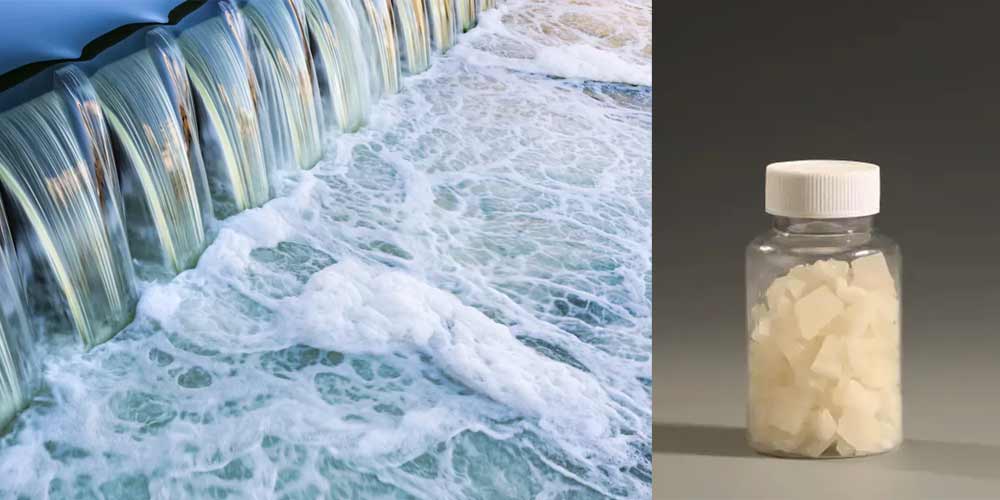טיפול במים הוא תהליך קריטי המבטיח אספקת מים נקיים ובטוחים למטרות שונות, כולל שתייה, תהליכים תעשייתיים ופעילויות חקלאיות. נוהג נפוץ בטיפול במים כרוך בהוספת...אלומיניום סולפט, המכונה גם אלום. תרכובת זו ממלאת תפקיד מכריע בשיפור איכות המים על ידי התמודדות עם אתגרים ספציפיים באספקת המים. במאמר זה, נחקור את הסיבות להוספת אלומיניום גופרתי למים ואת היתרונות שהיא מביאה.
קרישה ופלקולציה:
אחת הסיבות העיקריות להוספת אלומיניום גופרתי למים היא יעילותו בקרישה ובפלוקולציה. קרישה מתייחסת לתהליך של חוסר יציבות של חלקיקים מרחפים במים, וגורם להם להתקבץ יחד. פלוקולציה כרוכה ביצירת חלקיקים גדולים יותר, הנקראים פלוקים, מהחלקיקים הקרושים. אלומיניום גופרתי פועל כקריש, המסייע בהסרת זיהומים כגון מוצקים מרחפים, חומר אורגני ומיקרואורגניזמים.
הסרת עכירות:
עכירות, הנגרמת על ידי חלקיקים מרחפים במים, יכולה להשפיע על צלילותם ואיכותם האסתטית. אלומיניום סולפט מסייע בהפחתת עכירות על ידי קידום הצטברות החלקיקים הללו. הגושים הנוצרים שוקעים, מה שמאפשר סינון קל יותר ומספק מים צלולים יותר.
התאמת pH:
אלומיניום גופרתי תורם גם להתאמת רמת החומציות (pH) בטיפול במים. הוא פועל כמייצב pH, ועוזר לשמור על חומציות או בסיסיות המים בטווח הרצוי. רמות pH נכונות הן קריטיות ליעילותם של תהליכי טיפול אחרים ומבטיחות שהמים המטופלים יעמדו בתקנים הרגולטוריים.
הפחתת זרחן:
זרחן הוא רכיב תזונתי נפוץ שיכול להוביל לזיהום מים ואאוטרופיקציה כאשר הוא נוכח בעודף. אלומיניום גופרתי יכול לסייע בהפחתת רמות הזרחן על ידי יצירת תרכובות בלתי מסיסות איתו. זה עוזר למנוע צמיחה של אצות ואורגניזמים ימיים לא רצויים אחרים, ובכך לשפר את איכות המים.
שקיעת קרקע משופרת באגני משקעים:
במתקני טיהור מים, משתמשים באגני שיקוע כדי לאפשר לחלקיקים לשקוע בתחתית, מה שמקל על סילוקם. אלומיניום סולפט מסייע בשיפור השיקוע על ידי קידום היווצרות של גושי מים גדולים וצפופים יותר. התוצאה היא שיקוע יעיל יותר, מה שמפחית את העומס על תהליכי הסינון הבאים.
הוספת אלומיניום גופרתי למים משרתת מספר מטרות בטיפול במים, כולל קרישה, פלוקולציה, הסרת עכירות, התאמת רמת חומציות (pH) והפחתת זרחן. תהליכים אלה תורמים יחד לייצור מים נקיים ובטוחים לצריכה וליישומים תעשייתיים שונים. הבנת תפקידו של אלומיניום גופרתי בטיפול במים היא קריטית לייעול תהליך הטיפול ולהבטחת אספקת מים באיכות גבוהה לקהילות.
זמן פרסום: 19 בפברואר 2024


